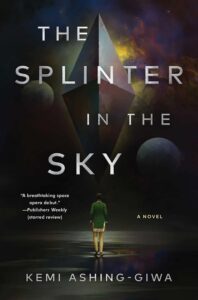The Splinter in the Sky by Kemi Ashing-Giwa is a debut science fiction story about Enitan, a teamaker and scribe who finds herself thrust into the heart of the empire that controls the moon village Koriko after her sibling Xiang disappears. Her on-again-off-again girlfriend, the governor of Koriko, turns up dead while attempting to help Enitan find Xiang, leaving Enitan with only one solution: volunteer to be the village’s hostage for the empire and try to find them herself. Along the way, she becomes involved with a group that seeks to undermine the same system Enitan wants to destroy. She learns more about the new Imperator, the empire’s figurehead, and the way the government really works than she ever thought she would.
I really thought I would like this book. “Characters who dive into the meat of the empire and attempt to destroy it from the inside” has been my favorite kind of story for years now. I’ve loved most versions of it that I’ve seen. I just didn’t love this one. If I were to recommend this book to anyone, it would be to someone who is first stepping into books like this and doesn’t want to go into the deep end yet. This story doesn’t push the boundaries of what an empire can do to its people, and as a reader, this was frustrating and an aspect of the book that lost me because of how unrealistic it is. It’s like the empire is there, looming over the horizon, but it never quite pushes its way past the narrative. It exists because the story needs it to exist, and that is all. If a reader doesn’t think they’re ready to encounter the worlds of A Memory Called Empire or The Traitor Baru Cormorant, then The Splinter in the Sky is a way to gauge how they feel without investing much emotion into the story.
Spoilers below.
This world feels less oppressive than it’s supposed to be. People walk around with enamel pins on their chests that showcase their gender identity. There is no imperialist issue that comes up due to Xiang’s use of they/them pronouns or due to Enitan’s sexuality. Enitan literally stumbles into the answers she needs on multiple occasions. There is no conflict regarding the Imperator as a love interest because Enitan does not feel any particular way about her until the end, after the reader knows the Imperator is fully on Enitan’s side and that she has clearly been smitten with Enitan from their first meeting. The characters use “therapy speak” in a way that feels unnatural and confusing. None of the stakes are real because there is no threat of permanent consequences. Xiang is gone, then Xiang is back. Enitan is ridiculed as the “Imperator’s mistress” due to the attention the Imperator shows her, and Enitan never strays or deals with the ramifications of making that claim a reality. Enitan goes into danger; the Imperator always, always gets her out, and if the Imperator isn’t there, then Xiang is, filling the same role.
To be blunt, Enitan doesn’t do much as a main character. The interesting things happen around her, and half of them, we never even get to see. Throughout the whole book, I couldn’t help wondering what this story would look like told from the Imperator’s perspective, in the point of view of a figurehead ruler who falls in love with their quasi-political hostage. The Imperator is the one who contributes the most to the plot, and we don’t even get to see her do it except when Enitan notices. I kept expecting the book to deliver on its premise, and it never did. If I am reading a book whose pull is that it is a sapphic criticism of empire and imperialism, I want it to give me that, and I want it to hit me where it hurts. This book did not meet any of my expectations. I was rooting for it to pull me in. A couple of my favorite plot movements were used in this novel, and I felt let down every single time. I never once feared for Enitan; I never feared for the Imperator or really for Xiang either, and Xiang’s disappearance is supposed to be the entire push into the novel. Enitan is written as the main character, but she is held at a certain distance from the ravaging of the empire for the entire book, even when we are supposed to believe she is not.
So: if you’re scared of stories that focus on a character’s infiltration and destruction of an empire, you can start here without worrying about a thing. Everything is easy, and coincidences appear for Enitan throughout the whole story. The three main characters you follow will always stay alive, and they will always get the things that they want. If you’ve read any heavier takes on empire before, though, I would suggest skipping this one.
For trigger warnings, this book includes military violence, xenophobia, and derogatory terms for sex workers.

